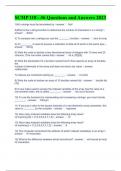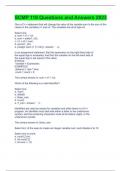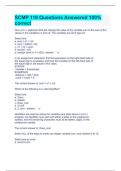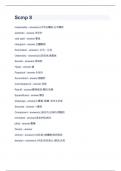Scmp 8 - Study guides, Class notes & Summaries
Looking for the best study guides, study notes and summaries about Scmp 8? On this page you'll find 4 study documents about Scmp 8.
All 4 results
Sort by

-
SCMP 118 - #6 Questions and Answers 2023
- Exam (elaborations) • 12 pages • 2023
-
Available in package deal
-
- $16.99
- + learn more
SCMP 118 - #6 Questions and Answers 2023 1)All c-strings must be terminated by Null 2)What is the c-string function to determine the number of characters in a c-string? Strlen 3) To compare two c-strings you use the ________ function. strm int cmp 4) An ________ is used to process a collection of data all of which is the same type. String 5) Write the code to declare a two dimensional array of integers with 10 rows and 20 columns. (The row index comes first) in...

-
SCMP 118 Questions and Answers 2023
- Exam (elaborations) • 20 pages • 2023
-
Available in package deal
-
- $20.49
- + learn more
SCMP 118 Questions and Answers 2023 Give a C++ statement that will change the value of the variable sum to the sum of the values in the variables n1 and n2. The variables are all of type int. Select one: a. sum = n1 + n2; b. sum = add(n1, n2); c. n1 + n2 = sum; d. sum(n1, n2); e. (assign (sum (+ n1 n2))) a. In an assignment statement, first the expression on the right-hand side of the equal sign is evaluated, and then the variable on the left-hand side of the equal sign is set equ...
Scmp 8

-
SCMP 118 Questions Answered 100% correct
- Exam (elaborations) • 20 pages • 2023
-
- $19.49
- + learn more
SCMP 118 Questions Answered 100% correct Give a C++ statement that will change the value of the variable sum to the sum of the values in the variables n1 and n2. The variables are all of type int. Select one: a. sum = n1 + n2; b. sum = add(n1, n2); c. n1 + n2 = sum; d. sum(n1, n2); e. (assign (sum (+ n1 n2))) a. In an assignment statement, first the expression on the right-hand side of the equal sign is evaluated, and then the variable on the left-hand side of the equal sign is se...

How did he do that? By selling his study resources on Stuvia. Try it yourself! Discover all about earning on Stuvia



